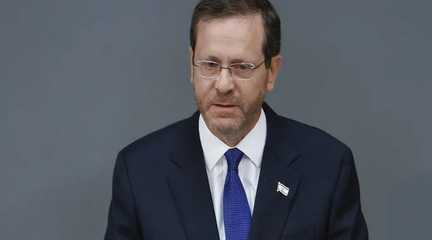
14 Mar 2023; MEMO: Israel's President Isaac Herzog said on Monday evening that the situation in the country is "very serious" and may have political, economic, social and security consequences, Israel Today has reported. He was speaking in light of the ongoing protests against the coalition government's plan for "judicial reform" which have seen tens of thousands of Israelis taking to the streets for the past ten weeks.
Herzog's remarks were made during a ceremony at which the Tel Aviv Municipality granted him and others honorary citizenship of the city. The president mentioned the upcoming vote in the Knesset on the government plan, and the impact of the divisions in Israeli society, which is evident in the huge demonstrations that the country has been witnessing.
"I would like to dedicate a few words to the internal struggle that is tearing us apart at this time," said Herzog. "It is no secret that I devote all my time and energy to finding agreements that will rescue us from the constitutional and social crisis we are in." He confirmed that he is meeting with all parties involved, including the government and the opposition. "This is not a political compromise, this is a Sisyphean effort to find a correct formula of balance and hope, because the situation is very difficult and worrying."
READ: Israel: Knesset approves draft law to block removal of prime minister
Mediation efforts led by Herzog with the aim of reaching an agreement have not made any significant progress so far. Opposition leaders are calling on the government to freeze legislation related to the "judicial reform" plan, to allow time for talks to take shape, and the government is calling for talks without preconditions.
Speaking at the same ceremony, President of the Supreme Court Esther Hayut said that she is looking with great concern at how the government is crushing Israeli unity and harming the delicate fabric of Israel's existence.
This week the government coalition is scheduled to present a controversial section of the judicial reform package to a vote in the Knesset. The section will grant Knesset members the ability to protect almost all laws from what they deem to be interference by the Supreme Court, explained the Times of Israel.
The Knesset approved the first reading of a package of the judiciary reform bill on 21 February which provides for changing the mechanism for forming the judges' selection committee, so that the government — in this case, the most extreme right-wing administration that Israel has ever had — has full control over it. The bill needs to pass three readings in parliament in order to become law.
According to the Israeli opposition, the government plan is a "judicial coup" and the beginning of the end for democracy in the occupation state. However, Prime Minister Benjamin Netanyahu has reiterated that it aims to restore the balance between powers — executive, legislative and judicial — that has been "violated" during the past two decades.




